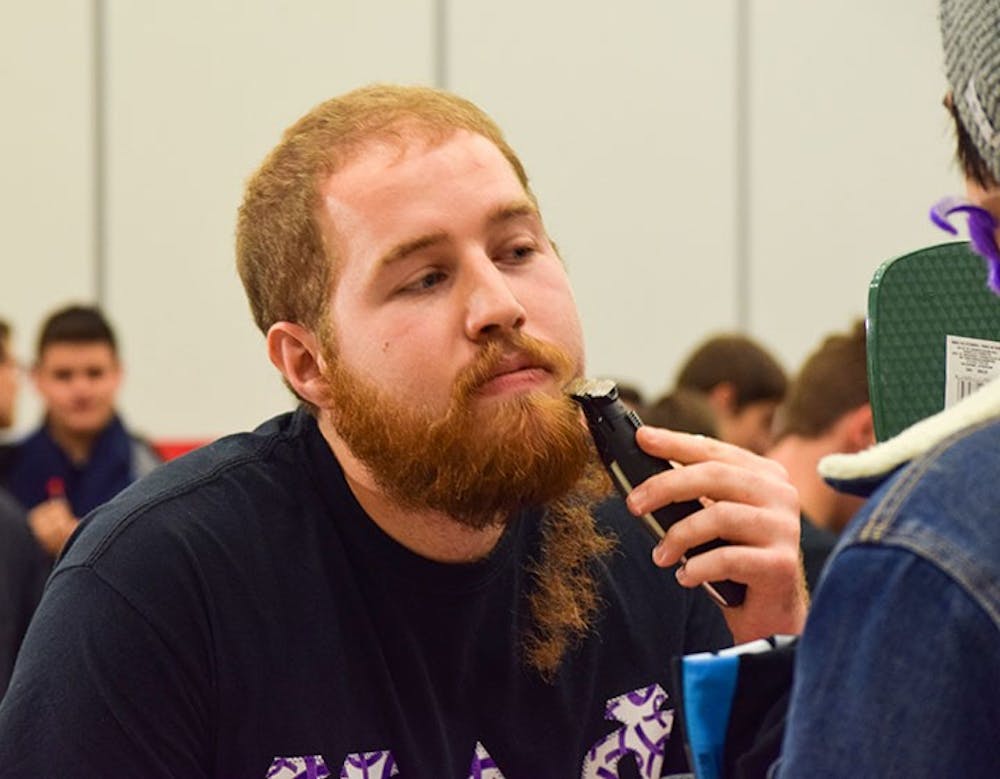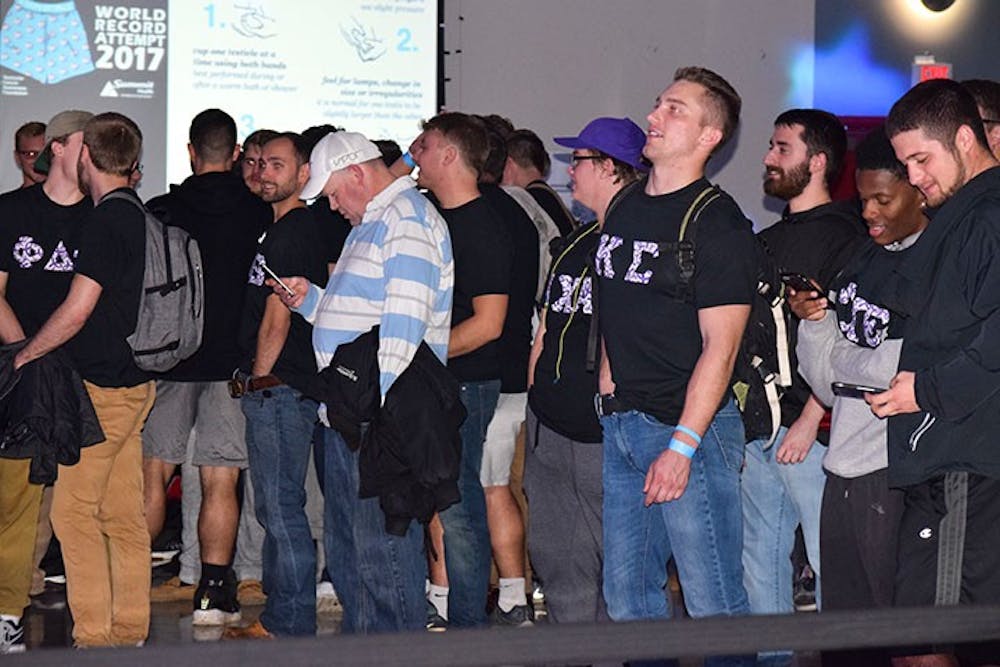This year, one in 263 men will be diagnosed with testicular cancer, and more than half of patients will wait for their condition to become severe before reporting their symptoms to a doctor, according to cancer.org.
Last week, Shippensburg University student Jason Greenspan set out to break a world record by having more than 208 men simultaneously check themselves for testicular cancer, while also raising awareness of the dangers of the cancer that Greenspan himself beat five years ago.
“Many of you may be just like me,” Greenspan said. “Little did I know, my life was going to change forever. My world stopped, and all I could think about was how my life was going to change.”
While most of his classmates were preparing for prom and graduation, Greenspan was undergoing nine weeks of chemotherapy that left him without hair, a feature he had always loved about himself.
“A lot of people think of chemotherapy patients as weak,” Greenspan said. “I think of someone who is strong and determined to live life.”
Since September, Greenspan campaigned all over campus, seeking male college students to participate in the Nov. 6 event, titled “Ship’s Got Balls.”

Greenspan celebrates after it is announced that 235 men participated in the event, breaking the event’s goal of 209 participants.
Along the way, he received sponsorships from student organizations including SUTV, WSYC and The Slate, as well as SU’s Women’s Center and Summit Health, an organization that provides health services to residents of south-central Pennsylvania. In addition to his on-campus advocacy, Greenspan is a board member of the Testicular Cancer Foundation.
After months of preparation, hundreds of men lined up at 7 p.m. outside the Ceddia Union Building Multipurpose Room (MPR), where each man was handed a blue wristband and asked to sign a waiver.
For the first hour, the men participated in “Shave the Date,” another event created by Greenspan in conjunction with No Shave November, a national movement where each participant shaves at the beginning of November and lets their hair grow back the rest of the month.
“I thought it sounded fun,” sophomore Jacob Dull said. “It’s nice seeing people here to support a cause.”
Greenspan’s parents, Tom and Wendi Schild, said they were impressed by the amount of work Greenspan was able to accomplish in only several months’ time.
“This is absolutely amazing — it is unbelievable,” Wendi said. “We are so proud of him.”
Shortly before 8 p.m., the participants filed into the other side of the MPR, where a dimly lit stage was erected and a DJ from WSYC played music. By 8 p.m., all of the participants were gathered in a roped-in area in front of the stage.
To kick off the event, SU’s cheerleading squad performed a cheer in support of the participants. Before the world record attempt, two testicular cancer survivors took to the stage to share their experiences fighting the disease.
Former Shippensburg Area High School Principal Bruce Levy was diagnosed in 1995 after experiencing a good amount of pain in his groin area.
Before being diagnosed, Levy received treatment for what doctors believed to be epididymitis, the inflammation of the tube at the back of the testicle that stores and carries sperm.
After three weeks of treatment, his symptoms worsened.
“Nothing was changing, I wasn’t getting any better,” Levy said.
Levy said in the three weeks he had been receiving treatment for epididymitis, his cancer had metastasized to Stage III testicular cancer, with the mass in his testicle growing to the size of a grapefruit.
Following three months of chemotherapy, Levy’s cancer was completely removed. Seven years later, Levy and his wife welcomed two biological sons despite being told by doctors that Levy’s cancer treatments, coupled with his wife’s own medical issues, would make their chances of having children low.
“If [a cancer diagnosis] happens, keep your faith, keep your faith strong, and have a good caregiver,” Levy said.
John Yarwood, a Summit Health physician assistant, said men should be checking themselves approximately once a month, preferably after a long shower.
Yarwood said men should see a medical professional if one of their testicles is exhibiting a difference in size or consistency. If a man does find something abnormal, Yarwood said they should not be too concerned, as only a small percent of abnormalities result in a testicular cancer diagnosis. Testicular cancer diagnoses that are caught early have a 95 percent survival rate, Yarwood said.
SU alumnus Justin Birckbichler said before receiving his cancer diagnosis he had always thought of cancer as a disease for old people.

An SU student shaves his face as part of “No Shave November.” Participants usually abstain from shaving for the rest of November to raise awareness for men’s health.
When Birckbichler discovered the majority of websites shared medical information about testicular cancer instead of personal experiences, he created “A Ballsy Sense of Tumor,” a blog where Birckbichler and other survivors could talk about their diagnoses openly.
Shortly before 9 p.m., Yarwood led the participants in checking themselves for testicular cancer.
After each man checked himself, Greenspan announced that 235 men had participated in the event, breaking the previous record of 208 men. Though Greenspan’s event unofficially broke the world record, all of the photos and video evidence from the event will be sent to Guinness to determine if the record has officially been broken.
“Everyone did amazing, and we met our goal,” Greenspan said. “I am very proud.”




The Slate welcomes thoughtful discussion on all of our stories, but please keep comments civil and on-topic. Read our full guidelines here.